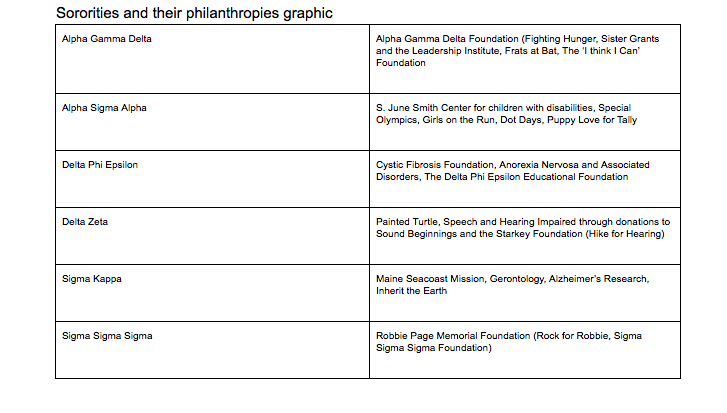
Sororities partake in annual events for specific philanthropies
It’s not hard to spot the women from Delta Zeta and Sigma Sigma Sigma on Truman State University’s campus wearing their pastel shirts with Greek letters proudly displayed on the front. But what might not be seen or often heard across campus is the money and fundraising these two sororities do for their respective charities at local and national levels.
Truman’s chapter of Delta Zeta last year alone raised $2,000 for The Starkey Hearing Foundation and its national chapter raised $2 million going into this school year.
“They do really cool work,” Delta Zeta Philanthropy Chair Konner Kness says.
“They provide hearing aids to people in impoverished and third-world countries who have never had the opportunity to hear before and helps them integrate back into their communities.”
One of the ways Delta Zeta is able to raise this money is through an event the sorority puts on called Hike For Hearing, Kness explains. The event begins with a short hike around Thousand Hills State Park, followed by a barbeque. Money is raised from selling tickets to hike, to eat a meal and to purchase a t-shirt for the event—and all were welcome to participate, according to Delta Zeta’s Facebook page.
In addition to Delta Zeta, Sigma Sigma Sigma also has its own charity event—Rock For Robbie. It raises money for the Robbie Page Memorial Fund, which was set up by the Sigma Sigma Sigma Foundation. The foundation’s point of interest is in child care, favoring the expression “Sigma Serves Children,” a common phrase that is used by the sorority on a national scale according to the Tri Sigma website.
“It supports children’s play therapy,” Tri Sigma Philanthropy Chair Caitlyn Lee says. “[Therapeutic play] incorporates play and fun into their world to help them while they’re in the hospital…it’s been shown to help those with social and mental disorders because they are interacting with others and being creative”
Truman’s chapter of Tri Sigma puts on an annual event called Rock For Robbie, which raises awareness and money for therapeutic play. Lee says for one week out of the year members of the sorority rock all day, every day in rocking chairs on the campus mall, usually netting several hundred dollars.
Desiree Paulhamus, communications director for the Tri Sigma Foundation, says the sorority at the national level raises about $3 million for the Robbie Page Foundation.
“Play therapy and therapeutic play — I don’t think is as well known as maybe some of the other medical causes out there,” Paulhamus says. “For us to be able to serve children in this way is impactful … even if Tri sigma has impacted one child. I think it’s definitely worth it.”
Other groups give back to Truman and Kirksville communities as well
In addition to Greek organizations engaging with the community to raise money for certain causes, other organizations in the community like First Baptist Kirksville church are trying to do a service to the local citizens here in town as well.
Charles Hunsaker, Director of Development and Outreach at Truman and member of First Baptist Kirksville says he likes seeing Truman students give back to the community, whether they’re doing it through non-secular organizations such as his church, a secular organization like a sorority or fraternity or just on their own.
“It’s exciting when community members all come together under the goal of serving others,” Hunsaker said. “We spend probably too much time serving ourselves in society so I think it’s really good when people come together on projects.”
Hunsaker says service is a great bridge between the University and the Kirksville community.
“ … Most people like to be served,” Hunsaker says. “Even if they don’t take you up on it they like to know they you were reaching out, that you were thinking about them, that you were willing to help. Certainly the more it’s done the better it is for the community. Kind of a town and gown between the University and the community is improved when the community knows that the students care about the community and the students get to learn that the community really cares about the students because we have a lot of things happening in our community that are geared towards the students. So it shows that caring for one another flows both directions.”

